Download - Pitt Med - University of Pittsburgh
Download - Pitt Med - University of Pittsburgh
Download - Pitt Med - University of Pittsburgh
You also want an ePaper? Increase the reach of your titles
YUMPU automatically turns print PDFs into web optimized ePapers that Google loves.
at Duke and director <strong>of</strong> education at the Duke Center for<br />
Integrative <strong>Med</strong>icine, Burk employs alternative treatments<br />
whenever practical. When his patients need an MRI scan, Burk<br />
uses hypnosis to guide them through a mental walk in the<br />
park, rather than administering a tranquilizer. When the scan<br />
is over, they don’t require time in a recovery room, and Burk<br />
says many are proud to have overcome their fear <strong>of</strong> the procedure<br />
without medication.<br />
As an undergrad at the <strong>University</strong> <strong>of</strong> <strong>Pitt</strong>sburgh, Frank<br />
Anania (MD ’88) was one <strong>of</strong> nearly 200 students in his<br />
Introduction to Molecular Biology class. As he walked into<br />
class one day, Albert Chung, his pr<strong>of</strong>, pulled Anania aside to<br />
talk to the young student about research opportunities.<br />
Anania was shocked that Chung had noticed him. He couldn’t<br />
imagine how a teacher could keep track <strong>of</strong> hundreds <strong>of</strong><br />
faces and names. Anania ended up spending the summer<br />
working in Chung’s lab, trying to isolate tumor cells. The<br />
endeavor helped him realize that he should pursue a<br />
research career. An assistant pr<strong>of</strong>essor <strong>of</strong> medicine and the<br />
director <strong>of</strong> the hepatology section at the <strong>University</strong> <strong>of</strong><br />
Maryland <strong>Med</strong>ical Center in Baltimore, Anania recently<br />
received a National Institutes <strong>of</strong> Health grant to study the<br />
role leptin plays in liver disease. Leptin controls a person’s<br />
appetite; Anania suspects it also affects stellate cells in the<br />
liver, causing scarring which occurs when a person suffers<br />
from chronic liver disease or cirrhosis. He will be heading to<br />
Emory <strong>University</strong> in the fall to continue his work there.<br />
RESIDENTS AND FELLOWS<br />
Deborah Armstrong (Internal <strong>Med</strong>icine Resident ’85–’87,<br />
Chief Internal <strong>Med</strong>icine Resident ’87–’88) is an assistant<br />
pr<strong>of</strong>essor <strong>of</strong> oncology at the Kimmel Comprehensive Cancer<br />
Center at Johns Hopkins <strong>University</strong> School <strong>of</strong> <strong>Med</strong>icine. As<br />
part <strong>of</strong> the Gynecologic Oncology Group, Armstrong conducts<br />
several nationwide studies on the effectiveness <strong>of</strong> targeted<br />
cancer therapies. Unlike chemotherapy, which<br />
patients cannot undergo for extended periods <strong>of</strong> time, the<br />
study’s noncytotoxic agents don’t kill cells and have low levels<br />
<strong>of</strong> toxicity, allowing treatment to continue indefinitely.<br />
The experimental therapies, now in Phase II trials, prevented<br />
cancers from spreading even when they couldn’t be cured<br />
or reduced. “You keep the cancer in check and basically<br />
let the patient live [with it] as opposed to going in<br />
with the big guns to cure it,” she says.<br />
Guy Petruzzelli (Otolaryngology Intern and<br />
Resident ’87–’92, Advanced Head and Neck Oncology<br />
and Cranial Base Surgery Fellow ’92–’93) recently<br />
became chair <strong>of</strong> the Department <strong>of</strong> Otolaryngology at<br />
Loyola <strong>University</strong> <strong>Med</strong>ical Center in Maywood, Ill. His<br />
“great role models” at <strong>Pitt</strong>—Eugene Myers, Jonas<br />
Johnson, and Carl Snyderman—nurtured his interest in<br />
head and neck research and surgery. Today, he is implementing<br />
ideas these mentors were developing a decade<br />
ago, including certain targeted therapies. Petruzzelli<br />
uses specifically engineered antibodies to single out<br />
cytokines produced by cancerous cells. Cytokines trick<br />
the body into depressing the immune system and growing<br />
blood vessels for life support. The antibodies latch<br />
onto the cytokines and destroy them without harming<br />
the rest <strong>of</strong> the body. Petruzzelli hopes the otolaryngology<br />
program at Loyola someday rivals <strong>Pitt</strong>’s.<br />
’90s<br />
RESIDENTS AND FELLOWS<br />
Cecelia Boardman (Obstetrics, Gynecology, and<br />
Reproductive Sciences Intern and Resident ’92 –’96,<br />
Fellow ’96–’97) first met N. Douglas Boardman III<br />
(Orthopedic Surgery Intern and Resident ’92–’98) at an<br />
orientation tour during their first week at the<br />
<strong>University</strong> <strong>of</strong> Pennsylvania. By the end <strong>of</strong> their third<br />
year <strong>of</strong> medical school, they were married. Now, both<br />
play with the LADSO shortly after moving to L.A.<br />
24 years ago. At the invitation <strong>of</strong> David Weiss,<br />
principal oboist <strong>of</strong> the Los Angeles Philharmonic,<br />
and a former member <strong>of</strong> the <strong>Pitt</strong>sburgh Symphony, Shulman began to play oboe in the<br />
Philharmonic both at the Hollywood Bowl and the Music Center. He later joined the<br />
orchestra as both an oboist and physician on tour in Mexico, Japan, and Europe.<br />
Then in 1990, the LADSO’s conductor left unexpectedly. Though many members <strong>of</strong><br />
the orchestra are MDs, Shulman assumed a nonphysician would become the next conductor—that’s<br />
what usually happened. Instead, the orchestra insisted that Shulman<br />
conduct the first concert that year. That concert went so well that the LADSO convinced<br />
him to stay on as music director.<br />
Each year, the LADSO performs benefit concerts, including some for breast cancer<br />
research. (Six members <strong>of</strong> the orchestra are breast cancer survivors; Shulman performed<br />
their surgeries.) A recent concert featured the American premiere <strong>of</strong> music written<br />
by Czech Jewish composer Erwin Schulh<strong>of</strong>f, who’d written the music while imprisoned<br />
in a Nazi concentration camp; he later died in the camps. “It was a very powerful<br />
It surprised alum Ivan<br />
Shulman when he was asked<br />
to direct the Los Angeles<br />
Doctors Symphony Orchestra.<br />
experience,” says Shulman. “The power <strong>of</strong> the music, even in<br />
those desperate times, that energy, rather inspires me. I want to<br />
take our orchestra where a community orchestra wouldn’t normally<br />
go.” —MH<br />
work at Virginia<br />
Commonwealth<br />
<strong>University</strong> School <strong>of</strong><br />
<strong>Med</strong>icine, where<br />
Cecelia Boardman is<br />
the acting director <strong>of</strong><br />
gynecologic oncology.<br />
Often she treats<br />
women who are dying<br />
1989 Hippocratean<br />
from ovarian cancer<br />
because the disease<br />
was detected too late. Boardman is trying to develop a<br />
way to detect ovarian cancer early in its development<br />
from a few drops <strong>of</strong> blood.<br />
Marc Safran (Orthopaedic Surgery Fellow ’93–’94)<br />
was recently appointed director <strong>of</strong> sports medicine at<br />
the <strong>University</strong> <strong>of</strong> California, San Francisco. His goals<br />
are research, teaching, and superior athlete care (and,<br />
he says, to be “the Freddie Fu <strong>of</strong> the West Coast”).<br />
After researching knee cartilage replacement treatments<br />
(now in Phase I trials) and surveying common<br />
injuries in wheelchair tennis players, Safran instituted<br />
a program in which physicians volunteer at more than<br />
20 public high schools. Before Safran’s program, a different<br />
paramedic usually oversaw each game. Now,<br />
doctors who are sports medicine experts provide more<br />
specialized and consistent care, rather than paramedics,<br />
who are better suited to treating traumatic<br />
injuries. The physicians monitor football games, training<br />
sessions, and a free drop-in clinic for sports-related<br />
injuries. —MH, SZ, and JM<br />
THE WAY WE ARE: CLASS OF ’88<br />
BY JENNIFER MATSON<br />
Keith Mankin (MD ’88) says<br />
that his dad, Henry Mankin<br />
(MD ’53), gave him two main<br />
pieces <strong>of</strong> advice when he decided<br />
to become a doctor. First, get out<br />
<strong>of</strong> medicine. Second, if you’re<br />
going to stick around, then make<br />
every patient the most important person to<br />
you in the world while you’re treating him or<br />
her. Mankin rejected the first piece <strong>of</strong> advice<br />
and embraced the second. A pediatric<br />
orthopaedic surgeon, Mankin tries to make<br />
spinal surgeries as comfortable as possible<br />
for his young patients. Often, donor blood is<br />
not suitable for transfusions in children, so<br />
two or three units <strong>of</strong> the child’s own blood<br />
must be drawn. The process is depleting and<br />
painful. When Mankin was at Massachusetts<br />
General Hospital in Boston, he began<br />
researching epoetin, a drug commonly used<br />
to raise the red blood cell count <strong>of</strong> people<br />
with anemia during cancer treatments. Since<br />
A UGUST 2003 37


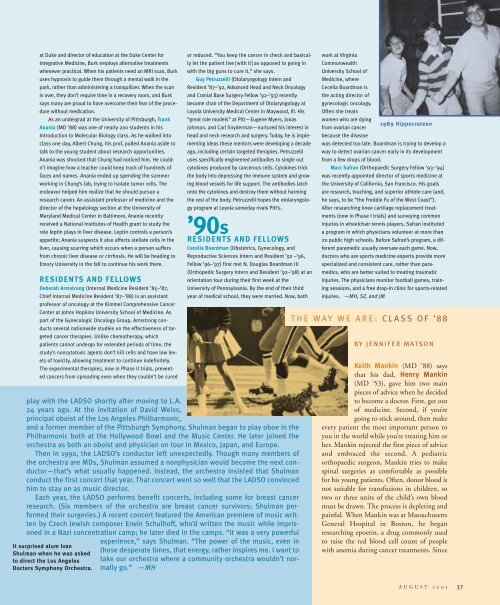
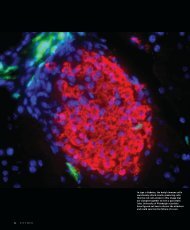
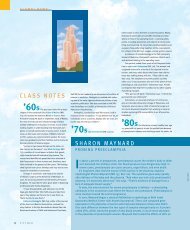
![entire issue [pdf 2.79 mb] - Pitt Med - University of Pittsburgh](https://img.yumpu.com/50435398/1/190x231/entire-issue-pdf-279-mb-pitt-med-university-of-pittsburgh.jpg?quality=85)
![entire issue [pdf 6.47 mb] - Pitt Med - University of Pittsburgh](https://img.yumpu.com/50360689/1/190x231/entire-issue-pdf-647-mb-pitt-med-university-of-pittsburgh.jpg?quality=85)
![entire issue [pdf 12.7 mb] - Pitt Med - University of Pittsburgh](https://img.yumpu.com/49831615/1/190x231/entire-issue-pdf-127-mb-pitt-med-university-of-pittsburgh.jpg?quality=85)
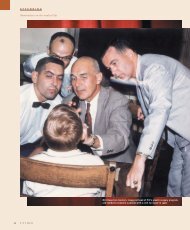
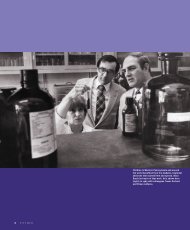
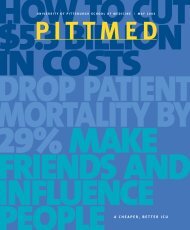
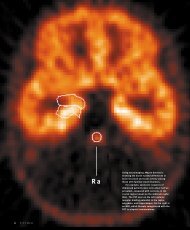
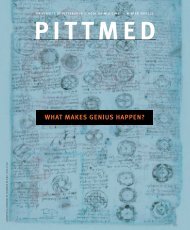


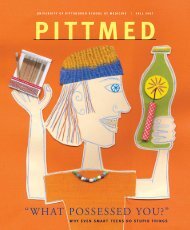
![entire issue [pdf 11.3 mb] - Pitt Med - University of Pittsburgh](https://img.yumpu.com/46685830/1/190x231/entire-issue-pdf-113-mb-pitt-med-university-of-pittsburgh.jpg?quality=85)
![entire issue [pdf 12.7 mb] - Pitt Med - University of Pittsburgh](https://img.yumpu.com/44997419/1/190x231/entire-issue-pdf-127-mb-pitt-med-university-of-pittsburgh.jpg?quality=85)